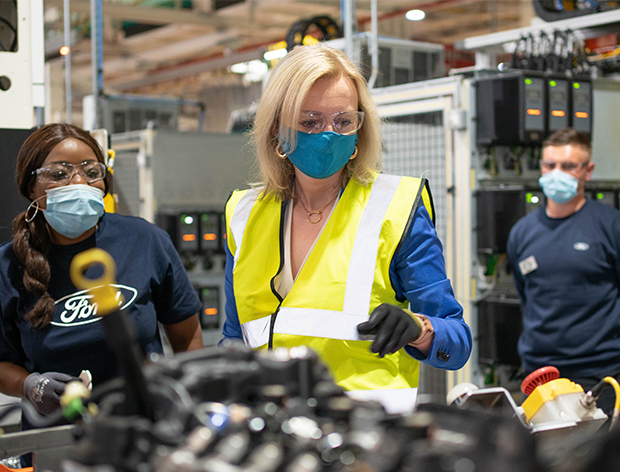UK Export Finance (UKEF) has announced it is providing a £500mn loan guarantee to automotive manufacturer Ford, a deal it says will support the development of electric vehicles and digital manufacturing.
The deal was announced by the UK’s international trade secretary Liz Truss (pictured) late on July 21, following a visit to Ford’s engine production plant in Dagenham, East London.
UKEF, the UK’s official export credit agency, is providing 80% cover for a five-year £625mn loan being financed by mandated lead arrangers and lenders Barclays, NatWest, Lloyds and SMBC. Citibank acted as co-ordinator and facility agent on the deal.
“This deal firmly puts the UK at the heart of Ford’s plans to grow its export business, reduce emissions and support skilled manufacturing jobs,” Truss says.
She adds the agreement supports government plans to put the automotive industry “at the heart of our strategy to remove barriers to trade when negotiating free trade deals”. The sector is expected to be a prominent part of trade talks with Japan.
UKEF says the guarantee is provided under its export development guarantee (EDG) scheme, which is designed to support companies’ general export activities without being tied to a specific contract.
The export credit agency’s business plan for 2020-24, published in June, explains that the EDG scheme has already been available for some time – although had not yet been formally launched.
It says the EDG scheme was first used to support a December 2019 loan to Jaguar Land Rover, which also consisted of 80% cover for lending totalling £625mn.
At the time that transaction was described by UKEF as falling within its general export facility (GEF) – also designed to support firms’ ongoing activities rather than individual export contracts, but aimed at smaller businesses.
However, UKEF’s business plan says the GEF has yet to launch, despite it being unveiled in March 2019.
Rolls-Royce has also benefited from UKEF support for general exporting activities, securing a £2bn loan facility with a five-year term and 80% cover earlier this month.
The government says the EDG scheme is available to companies that have generated 5% of their turnover from UK exports in each of the last three years, plus at least 20% of their turnover in one of those years.
It carries a minimum transaction size of £25mn and a maximum repayment period of five years.
In Ford’s case, the government says the loan will “support investment into electrification, digital manufacturing and smart mobility solutions”.
It adds that Ford – whose exports total around £2.5bn annually – is “reinventing its product development and manufacturing processes in the UK to reduce vehicle emissions”, and plans to launch its first all-electric transit van in 2021.
UKEF has faced growing pressure to up its support for sustainable export activity. A parliament Environmental Audit Committee report published in October 2019 recommended that the government require it to “work towards net-zero emissions by 2050”.
In a letter to business secretary Alok Sharma published this week, Labour Party MP Matthew Pennycook pointed out that between 2013 and 2018, 96% of UKEF’s support for global energy projects went towards fossil fuel ventures.
Pennycook suggested UKEF’s mandate be changed “to ensure that any financing provided by it is aligned with the UK’s climate commitments and the Paris agreement”.
As of press time Sharma had not responded publicly to that letter, but in separate remarks welcoming a £350mn government funding boost towards cutting carbon emission, said: “Climate change is among the greatest challenges of our age. To tackle it we need to unleash innovation in businesses across the country.”







